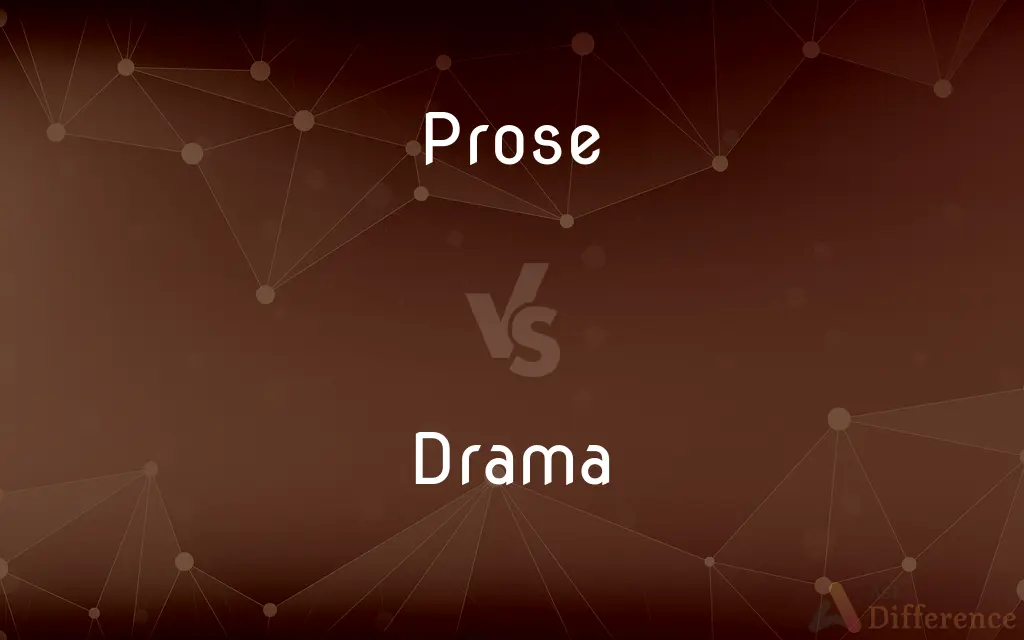Prose vs. Drama — What's the Difference?
Edited by Tayyaba Rehman — By Fiza Rafique — Updated on November 5, 2023
Prose is ordinary written or spoken language without structured meter, while drama is a composition intended for performance by actors.

Difference Between Prose and Drama
Table of Contents
ADVERTISEMENT
Key Differences
Prose is the form of written or spoken language that follows natural speech, without the structured patterns of verse. Drama, however, is a genre of literature intended for performance by actors in front of an audience.
In prose, the writer communicates ideas through sentences and paragraphs, focusing on narrative and description. Drama conveys its narrative through dialogue and action, presented in the format of scripts or plays.
Prose is typically found in novels, short stories, articles, and essays where the emphasis is on storytelling or exposition. Drama is primarily composed as plays and scripts meant for theatrical performance, emphasizing dramatic structure.
While prose can be rhythmic and use poetic devices, it is not bound by the constraints of meter and rhyme that are often found in poetry. Drama is characterized by its direct impact, using performance, stagecraft, and often, written stage directions to bring the story to life.
To summarize, prose is a form of language that reflects everyday communication, suited for a wide range of genres, while drama is specifically crafted for the stage, relying on the combined efforts of playwrights, directors, actors, and designers.
ADVERTISEMENT
Comparison Chart
Form
Written in natural language.
Written in script form.
Purpose
To tell a story or express ideas.
To be performed by actors.
Structure
Composed of sentences and paragraphs.
Composed of dialogue and stage directions.
Presentation
Meant to be read.
Meant to be acted out.
Devices
Uses narrative techniques.
Uses theatrical techniques.
Compare with Definitions
Prose
Prose can refer to creative writing in the form of novels or short stories.
The author's prose captivated readers with its clarity and wit.
Drama
Drama refers to the art of composing plays.
His gift for drama was evident in the intricate characters he wrote.
Prose
Prose is ordinary spoken or written language.
Her prose flowed as naturally as her thoughts.
Drama
Drama is a genre of narrative fiction (or semi-fiction) intended to be more serious than humorous in tone.
The film was a historical drama based on true events.
Prose
Prose is used in expository writing to explain or inform.
The textbook's prose broke down complex topics into understandable language.
Drama
Drama is a composition in prose or verse presenting a story in pantomime or dialogue.
The drama club's latest production received rave reviews.
Prose
Prose is a form of written (or spoken) language that usually exhibits a natural flow of speech and grammatical structure—an exception is the narrative device stream of consciousness. The word "prose" first appears in English in the 14th century.
Drama
Drama is literature meant for performance.
They studied the drama of Shakespeare in class.
Prose
To write prose.
Drama
A play for theatre, radio, or television
A gritty urban drama about growing up in Harlem
Prose
Prose is any writing that is not in verse.
His essays are examples of prose that inform and argue.
Drama
A serious narrative work or program for television, radio, or the cinema.
Prose
Prose often uses a more casual language style.
She preferred the conversational prose of personal blogs.
Drama
Drama is the specific mode of fiction represented in performance: a play, opera, mime, ballet, etc., performed in a theatre, or on radio or television. Considered as a genre of poetry in general, the dramatic mode has been contrasted with the epic and the lyrical modes ever since Aristotle's Poetics (c.
Prose
Ordinary speech or writing, without metrical structure.
Drama
An exciting, emotional, or unexpected event or circumstance
A hostage drama
An afternoon of high drama at Wembley
Prose
Commonplace expression or quality.
Drama
A prose or verse composition, especially one telling a serious story, that is intended for representation by actors impersonating the characters and performing the dialogue and action.
Prose
Roman Catholic Church A hymn of irregular meter sung before the Gospel.
Drama
Theatrical plays of a particular kind or period
Elizabethan drama.
Prose
To speak or write in a dull, tiresome style.
Drama
The art or practice of writing or producing dramatic works.
Prose
Language, particularly written language, not intended as poetry.
Though known mostly for her prose, she also produced a small body of excellent poems.
Drama
A situation or succession of events in real life having the dramatic progression or emotional effect characteristic of a play
The drama of the prisoner's escape and recapture.
Prose
Language which evinces little imagination or animation; dull and commonplace discourse.
Drama
The quality or condition of being dramatic
A summit meeting full of drama.
Prose
(Roman Catholicism) A hymn with no regular meter, sometimes introduced into the Mass.
Drama
A composition, normally in prose, telling a story and intended to be represented by actors impersonating the characters and speaking the dialogue
The author released her latest drama, which became a best-seller.
Prose
To write or repeat in a dull, tedious, or prosy way.
Drama
Such a work for television, radio or the cinema (usually one that is not a comedy)
Prose
The ordinary language of men in speaking or writing; language not cast in poetical measure or rhythm; - contradistinguished from verse, or metrical composition.
I speak in prose, and let him rymes make.
Things unattempted yet in prose or rhyme.
I wish our clever young poets would remember my homely definitions of prose and poetry, that is; prose - words in their best order; poetry - the best order.
Drama
Theatrical plays in general
Prose
Hence, language which evinces little imagination or animation; dull and commonplace discourse.
Drama
A situation in real life that has the characteristics of such a theatrical play
After losing my job, having a car crash, and the big row with my neighbours, I don't need any more drama.
Prose
A hymn with no regular meter, sometimes introduced into the Mass. See Sequence.
Drama
(slang) Rumor, lying or exaggerated reaction to life or online events; melodrama; an angry dispute or scene; a situation made more complicated or worse than it should be; intrigue or spiteful interpersonal maneuvering.
Prose
Pertaining to, or composed of, prose; not in verse; as, prose composition.
Drama
A composition, in prose or poetry, accommodated to action, and intended to exhibit a picture of human life, or to depict a series of grave or humorous actions of more than ordinary interest, tending toward some striking result. It is commonly designed to be spoken and represented by actors on the stage.
A divine pastoral drama in the Song of Solomon.
Prose
Possessing or exhibiting unpoetical characteristics; plain; dull; prosaic; as, the prose duties of life.
Drama
A series of real events invested with a dramatic unity and interest.
Westward the course of empire takes its way;The four first acts already past,A fifth shall close the drama with the day;Time's noblest offspring is the last.
The drama and contrivances of God's providence.
Prose
To write in prose.
Drama
Dramatic composition and the literature pertaining to or illustrating it; dramatic literature.
Prose
To write or repeat in a dull, tedious, or prosy way.
Drama
A dramatic work intended for performance by actors on a stage;
He wrote several plays but only one was produced on Broadway
Prose
To write prose.
Prosing or versing, but chiefly this latter.
Drama
An episode that is turbulent or highly emotional
Prose
Ordinary writing as distinguished from verse
Drama
The literary genre of works intended for the theater
Prose
Matter of fact, commonplace, or dull expression
Drama
The quality of being arresting or highly emotional
Drama
Drama often represents conflict or emotion.
The courtroom drama unfolded with unexpected twists.
Common Curiosities
Can prose contain dialogue?
Yes, prose can include dialogue as part of the narrative.
What is prose?
Prose is written or spoken language in its ordinary form, without metrical structure.
Do all dramas have to be serious?
No, dramas can vary in tone and include comedy, tragedy, and other genres.
What defines drama?
Drama is a mode of storytelling intended for theatrical performance.
Does prose follow a strict format?
No, prose does not have the strict structural rules that poetry or drama has.
What’s the main goal of drama?
The main goal is to tell a story through characters and action, often with a focus on human conflict.
How important is dialogue in drama?
Dialogue is crucial in drama as it is the primary means of storytelling.
Is drama only performed in theaters?
Primarily, yes, but drama can also be adapted for film, television, or radio.
Are plays the only form of drama?
Plays are the central form, but drama can include other forms like radio plays and screenplays.
Can drama be non-fictional?
Yes, drama can be based on real events or figures, such as in historical dramas.
Can prose be poetic?
Prose can use poetic devices but generally does not follow a rhythmic meter like poetry.
Is a prose poem considered prose?
Yes, though it blurs the lines by using poetic techniques in prose form.
How is prose typically presented?
Prose is typically presented in novels, essays, and other written forms meant for reading.
Can prose and drama overlap?
Yes, in narrative dramas, the prose style is often used for character monologues and descriptions.
What’s a common feature of prose?
A common feature is its use of complete sentences and paragraphs.
Share Your Discovery

Previous Comparison
Tie vs. Draw
Next Comparison
Sorcerer vs. WitchAuthor Spotlight
Written by
Fiza RafiqueFiza Rafique is a skilled content writer at AskDifference.com, where she meticulously refines and enhances written pieces. Drawing from her vast editorial expertise, Fiza ensures clarity, accuracy, and precision in every article. Passionate about language, she continually seeks to elevate the quality of content for readers worldwide.
Edited by
Tayyaba RehmanTayyaba Rehman is a distinguished writer, currently serving as a primary contributor to askdifference.com. As a researcher in semantics and etymology, Tayyaba's passion for the complexity of languages and their distinctions has found a perfect home on the platform. Tayyaba delves into the intricacies of language, distinguishing between commonly confused words and phrases, thereby providing clarity for readers worldwide.















































